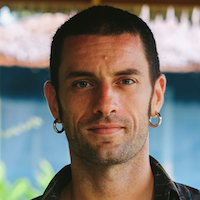
~
*Dear elephant reader: if you’re single & looking for mindful dating or conscious love, try out our lovely partner, MeetMindful.
~
So many movies, books and songs celebrate the fight for love, the struggle to take someone back, the heroism of not resigning to a break-up.
This may sound romantic but, if you think about it, fighting for love is almost a contradiction in terms.
We all agree that love cannot be bought. But can love really be won, either?
Or, to put it another way: how many examples do you know of truly loving relationships that had to be enforced, fought for, hammered into their shape? (Movie characters don’t count.)
Okay, it is true that relationships may require some effort from time to time. In intimacy, the lives of two (or more) partners become so intertwined that they start feedbacking on each other, creating complex scenarios. A bit of determination and a good dose of willpower may sometimes be necessary to navigate through some of those intricate situations.
Yet, if we get to the point where we need to fight for our relationship to continue, something is not right.
If struggling and effort become a habit, rather than a sporadic problem-solving strategy, the relationship may well have had its day. If we are honest with ourselves, we might find out that we are trying to resist a change that will happen anyway, despite our best efforts.
Let’s face it: most of the time we don’t fight because of love, but because of fear. And what we fear, in one form or another, is change. But is change really a problem?
Change is a quintessential part of our existence, and that definitely applies to relationships. We generally can’t say for sure how long a relationship will last—and clearly we can’t foresee when a new relationship is about to start. Life is ever changing and surprising—which is no small part of its beauty. Still, our mind often resists change and, to justify its stubbornness, it sometimes pretends that it can see into the future.
Take break-ups, for example. When we try to save a relationship in the name of love, our mind may be playing fortune-teller in the background. It may be whispering over and over again how disastrous the future will be, should we let our current partner walk away. We may think that we will always be alone, that we will never find another (comparable) lover, that we will suffer forever.
But really, there is no way that we can predict the consequences of a break-up (or any other change, for that matter), and what changes it will bring into our lives.
Often, in order for something beautiful and new to happen, something else needs to disappear and “die.” In relationships, this means that break-ups can actually be positive turning points in our lives, and they can bring us to the next step in our personal growth. By trying to save a relationship we might be forestalling a positive change indefinitely. Who knows? A wonderful potential partner might be lurking just around the corner, waiting for us to make space and allow a new relationship to begin.
This may all sound logical, but most of us have problems letting go of relationships, careers and possessions. We tend to develop a clinging attitude that tries to freeze our life in its current state, resisting all change and transformation.
The sad irony is that, despite all of our fighting, the change that we were resisting usually ends up happening anyway. The relationship that we frantically tried to save ends some months or years later, perhaps even more painfully. Unfortunately, no one can give us back the time and energy that we wasted in trying to prevent things to go the way they were supposed to.
So what about trying a different approach, and embracing change instead of fighting against it?
Courage is usually associated with fighting, but there is great courage in acceptance and surrendering too. Letting relationships unfold the way they are supposed to, without trying to impose our will on them, is often the heroic thing to do.
Could we allow a relationship to begin, grow, transform and then dissolve—accepting each of these stages with gratitude?
Could we nurture it and care for it, without trying to force it into a preconceived shape or duration?
This requires a great deal of courage and trust—trust that we will be taken care of, and all we really need to do is focus on the present moment and do the right thing.
Change in relationships (and in our lives in general) comes to us like an unpredictable ocean wave. Sometimes it is just a little ripple on the surface of the water; sometimes, it feels more like a tsunami. But surfing the wave is usually a wiser choice than trying to push against it.
We don’t know exactly where the current is going to carry us, but we can take care of not drowning—and perhaps even enjoy the ride.
Relephant Read:
What Actually Saved the Relationship (Hint: It’s not Love).
Author: Raffaello Manacorda
Editor: Emily Bartran
Photo: Abigal Keenster/Unsplash











Read 4 comments and reply